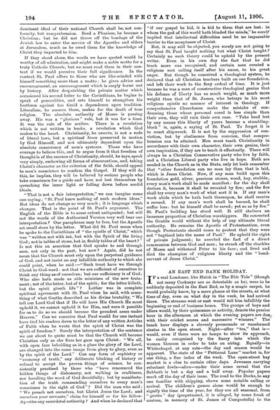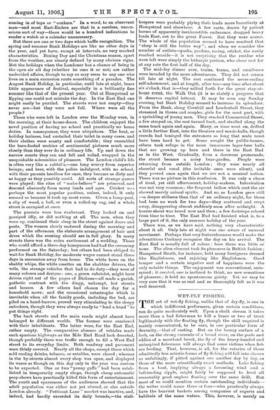AN EAST END BANK HOLIDAY.
IF a real Londoner, like Huish in "The Ebb Tide" (though not many Cockneys are as detestable as he), were to be suddenly deposited in the East End, as by a magic carpet, be would probably know, by a mere glance at the streets, at what time of day, even on what day in the week, he had arrived there. The streams west or east would tell him infallibly the beginning or end of business hours. The groups of boys and idlers would, by their quiescence or activity, denote the precise hour in the afternoon at which the evening papers are duik. with their cricket scores and successive "winners." The lunch hour displays a slovenly promenade or unashamed siestas in the open street. Night—after "tea," that is— would, even if there were no lamps to show its approach, be easily recognised by the finery into which the women blossom in order to take an airing. Equally—in Whitechapel, at any rate—the day and season would be apparent The state of the "Petticoat Lane" market is, for one thing, a fine index of the week. The open-street hay market is a clue to certain other days. Jewesses carrying reluctant fowls—alive—under their arms reveal that the Sabbath is but a day and a half away. Popular papers mark off the day of their issue. The road to the Docks, to any one familiar with shipping, shows some notable sailing or arrival. The children's games alone would be enough to signify the time of the year, for they are all seasonal, from " grotto " day (perpetuated, it is alleged, by some freak of custom, in memory of St. James of Compostella) to the
coming in of tops or "conkers." In a word, to an observant man—and most East-Enders are that in a careless, uncon- scious sort of way—there would be a hundred indications to render a watch or a calendar unnecessary.
But there are one or two days which baffle recognition. The spring and summer Bank Holidays are like no other days in the year, and yet have, except at intervals, no very marked characteristics. Boxing Day and the Christmas season, apart from the weather, are clearly defined by many obvious signs. But the holidays when the Londoner has a chance of being in the open air all day (whether he uses it or not) are rather undecided affairs, though to say so may seem to any one who lives on a main excursion route something of a paradox. The August Bank Holiday, in particular, until late at night, bears little appearance of festival, especially in a brilliantly fine summer like that of the present year. Out at Hampstead or Epping one could not mistake the day. In the East End one might easily be puzzled. The streets were not empty—they never are—but they were not full. Where were all the people ?
Those who were left in London over the Monday were, in the morning, at their house-doors. The children enjoyed the novel position of having no school and practically no home duties. In consequence, they were ubiquitous. The heat, or holiday laziness, had curtailed their toilet in many oases, and their clothes were scanty and comfortable ; they resembled the bare-footed urchins of sentimental pictures much more closely than they ever do in ordinary life. Up and down the narrow courts they ran and fell and rolled, wrapped in the unspeakable solemnities of pleasure. The London child's life is often very like a rabbit's,—one long sonny from superior beings; and here, with the police indulgent, with no school, with their parents heedless for once, they became as dirty and as happy as they possibly could. All sorts of strange games were played : the rites of " make-believe " are primeval, and descend obscurely from many lands and ages. Cricket was perhaps the most popular pastime, unless, indeed, it only seemed so because it took up most room. Given a lamp-post, a slip of wood, a ball, or even a rolled-up rag, and a whole street is occupied at once.
The parents were less exuberant. They looked on and gossiped idly, or did nothing at all. The men, when they were up, continued their sleep in the street against doors and posts. The women slowly matured during the morning and part of the afternoon the elaborate arrangement of hair and dress which the evening should see in full glory. In many streets there was the extra excitement of a wedding. Those who could afford a three-day honeymoon had had the ceremony performed on the Saturday; but others had been obliged to wait for Bank Holiday, for moderate wages cannot stand three days in succession away from home. The white bows on the shabby whips, the white rosettes on the shabbier drivers, the veils, the strange vehicles that had to do duty—they were of many colours and designs : one, a green cabriolet, might have driven right out of the pages of Dickens—all made a garish, pathetic contrast with the dingy, unkempt, hot streets and houses. A few others had chosen the day for a household move; and the occasional catastrophe which is inevitable when all the family goods, including the bed, are piled on a hand-barrow, proved very stimulating to the sleepy onlookers, though they were always ready to "lend a hand " to put things right.
The back streets and the main roads might almost have belonged to different worlds. The former were cumbered with their inhabitants. The latter were, for the East End, rather empty. The comparative absence of vehicles made such spacious highways as the Mile End Road look deserted, though probably there was traffic enough to fill a West End street to its everyday limits. Both roadway and pavement were thinly covered. Nearly all the shops, except those which sold cooling drinks, tobacco, or eatables, were closed ; whereas in the by-streets almost every shop was open, and displayed its wares as though on this day only in the year was custom to be expected. One or two "penny gaffs" had been estab- lished in temporarily empty shops, though cheap automatic peep-shows have practically killed this form of entertainment. The youth and sparseness of the audiences showed that the adult population was either not yet abroad, or else outside London already. "Petticoat Lane" market was inactive, and, indeed, had hardly exceeded its daily bounds,—the stall-
keepers were probably plying their trade more lucratively at Hampstead and elsewhere. A few carte, drawn by patient horses of apparently inexhaustible endurance, dragged heavy loads East, out to the great Forest. But they were scarce. The whole of the population seemed to have resolved that "sleep is still the better way "; and when we consider the number of outlets—parks, gardens, racing, cricket, the easily reached seaside—it is not surprising that the residue who were left were simply the lethargic portion, who chose rest for at any rate the first half of the day.
The mid-day dinner over, trains, trams, and omnibuses were invaded by the more adventurous. They did not return till late at night. The rest continued the never-ending self-adornment, and at length, after tea—any time after about six o'clock, that is—they sallied forth for the great stay-at- home event, the Walk Out (it is so stately a progress that it deserves capital letters). It may be seen any Sunday evening, but Bank Holiday seemed to increase its splendour. From the Bank, along Cornhill and Leadenhall Street, they streamed in threes and couples, girls for the most part, with a sprinkling of young men. They reached Commercial Street, a few strayed on, the rest turned back, and strolled along the same track again and again. Many, as time went on, drifted a little further East, into the theatres and music-balls, though crowds had besieged the entrances so long that seats must have been hard to get. Some sought the public-houses, others took refuge in the more innocuous lager-beer halls that are growing up here and there in the East End as in the West. Gradually, from a decorous promenade, the street became a noisy bear-garden. People were returning from outside London ; they were nearly all cheerful and vocal (the irritable ones were silent), and they proved once again that we are not a musical nation. There was no picture in this confusion. It was only a chaos of tired, yet still effervescent, holiday-makers. Intoxication was not very common; the frequent bellow which rent the air showed merely animal spirits. And so, as London grew still —a deeper stillness than that of an ordinary night, for there had been no work for two days—they scattered and crept away, disappearing almost suddenly soon after midnight. A hoarse shout was beard now and then; a few footsteps echoed from time to time. The East End had finished what is, to a large part of it, the only summer holiday of the year.
There was, as we have said, nothing very characteristic about it all. Only late at night was one aware of unusual merriment. Perhaps that very featurelessness would make the adventitious Cockney recognise the day on his arrival. The East End is usually full of colour : here there was little or none. The alien element took its pleasures in British fashion ; Hampstead Heath, for instance, held many foreigners dressed like Englishmen, and rejoicing like Englishmen. Good temper and a certain negative sort of happiness were the only notable things. The enjoyment was conventional, unin- spired; it created, one is inclined to think, no new sensations of pleasure ; it held no spontaneous gaiety. Yet we may be very sure that it was as real and as thoroughly felt as it was well deserved.



































 Previous page
Previous page